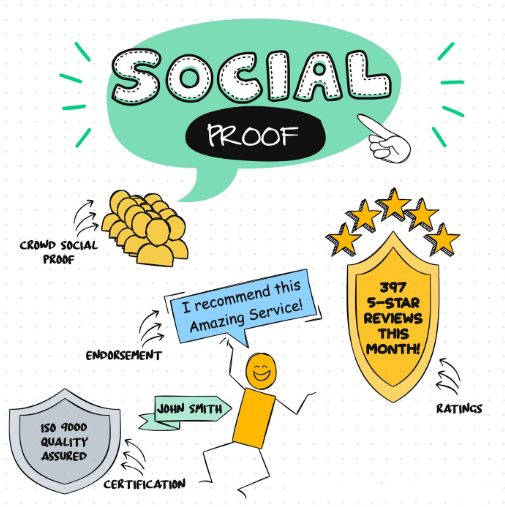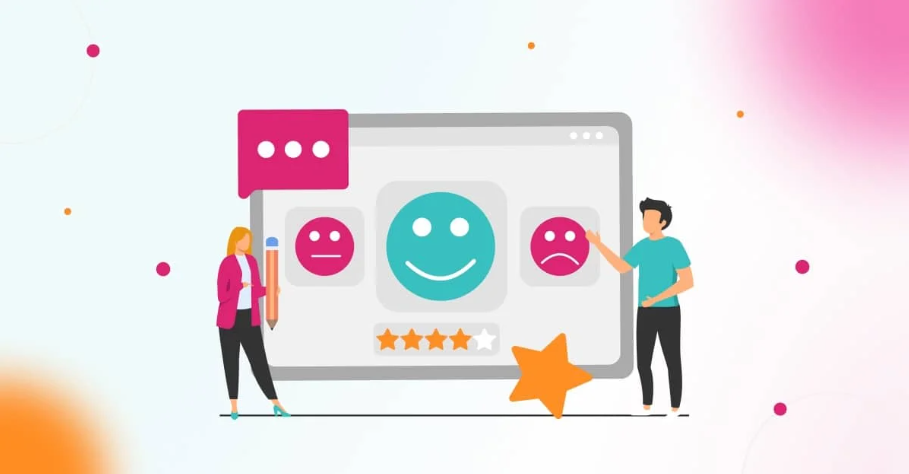Online reviews are becoming a crucial trust signal in the digitally first society. Evaluations greatly influence people’s choices, whether they are looking for an internet product, a nearby restaurant, or an IT company. However, what underlies this influence? Why do we readily believe the opinions of strangers? We must investigate the psychology of reviews and how companies might use them to establish and maintain reputation to comprehend this.
1. Psychology of Social Proof in Reviews: Why We Follow the Crowd

Social proof, a behavioral science idea that implies people often imitate the behavior of others in ambiguous circumstances, is at the core of review psychology. Because “so many others” have endorsed a company, prospective buyers will see it as reliable when they see hundreds of good reviews.
- Implied quality = perceived popularity.
- “If others had a good experience, I will too” is a common assumption made by consumers.
- In fields like software development or legal services, where people have minimal prior experience, this effect is more pronounced.
2. Cognitive Biases: How Decisions Are Short-Cut by the Brain
Humans are hardwired to look for judgments that are rapid and effective. Reviews make this process easier.
Confirmation Bias: Reviews that support one’s expectations or beliefs are typically preferred by the public. Someone will look for good evaluations to support their belief that a product is of great quality.
Bias in negativity: Even if they are rare, negative reviews tend to stick in people’s minds more than good ones. If it seems sincere, one thorough complaint can trump dozens of 5-star reviews.
Bias in Recency: The most recent evaluations are frequently valued by customers more than older ones since they are thought to represent the product or service’s current quality.
3. Genuineness Is More Important Than Perfection
Unexpectedly, a flawless 5.0 rating out of hundreds of reviews could raise red flags. Why? Because consumers are aware of the fact that nothing is perfect.
- Perfect scores alone don’t seem as reliable as a combination of largely positive and a few negative evaluations.
- Reviews that are narrative and detailed—that is, that include actual names, dates, and particular experiences—are typically more trusted than those that are general and ambiguous.
- Verified reviews are given more weight, particularly if they include images.
4. The Significance of Consistency and Review Volume
Just as important as the quality of the reviews is their quantity. A company with 500 reviews with an average rating of 4.6 stars will be trusted more rapidly than one with just five excellent reviews.
- Businesses that receive consistent feedback over time are more likely to be trusted by their customers.
- Long pauses in evaluations or abrupt spikes can raise questions.
- Regular interaction, in which the company responds to both favorable and unfavorable comments, also improves perceived dependability.
5. Credibility of the Platform: The Location of the Review
Reviews are not all given the same consideration. The platform on which reviews are submitted has an impact on trust.
- Because of their verification procedures, Google, Facebook, TripAdvisor, Yelp, and Trustpilot are all regarded as reliable.
- If reviews are not backed up by user-generated material or third-party integration, they may be regarded with suspicion on a company’s own website.
- Industry-specific platforms (such as G2 for SaaS or Clutch for tech) aid in confirming specialty credentials and topic expertise.
6. Emotional Impact: Narrative and Compassion in Evaluations
Reviews have emotional weight in addition to factual weight. Empathy and connection are sparked by a narrative review that details how a service resolved a real-world issue.
- Much more than just star ratings, consumer trust is influenced by feelings like relief, excitement, or thankfulness.
- An example of a review that evokes urgency and emotional resonance is when it says, “They recovered our lost data just hours before a crucial presentation.”
7. Negative Reviews: A Lost Opportunity

Negative reviews don’t automatically undermine trust, despite popular notion; how a company handles them is significantly more important. Should You Buy Google Reviews? The Answer May Surprise You.
- A courteous, solution-focused answer demonstrates professionalism and responsibility.
- How you respond to criticism is a common way for potential consumers to assess your customer service culture.
- Open communication helps repair harm and can even turn unhappy consumers into devoted ones.
8. How Businesses Can Apply the Psychology Behind Reviews Effectively
Businesses that want to use reviews to increase trust should:
- Actively promote reviews, particularly following fruitful exchanges.
- Utilize thank-you websites, follow-up emails, or QR codes to direct customers to review platforms.
- Third-party plugins can be used to show current reviews on your website.
- Teach your team to react empathetically to reviews, regardless of whether they are positive or negative.
- Examine the material for insights into what the audience expects, then make the necessary improvements.
Conclusion: You Have to Earn It, Not Claim It
Reviews are psychological trust enhancers that go well beyond simple digital ratings. They impact perception, motivate choices, and mold your online persona. Businesses may more effectively build trust, humanize their brand, and create long-term credibility in a congested digital marketplace by comprehending the behavioral science that underlies these strategies.


https://shorturl.fm/Vv0SL
https://shorturl.fm/8fJ7h
https://shorturl.fm/pJpcb